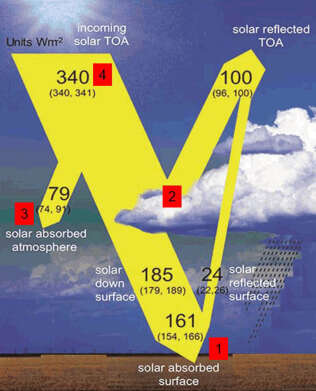
A paper published late last year by climate scientists James Hansen and colleagues claims that the rate of global warming is poised to increase by 50% in the coming decades.
Disclaimer: James Hansen has a bit of a checkered reputation within the climate community. There is a faction that discounts much of what he says. However, he has some stellar credentials and at one time was a leading voice on greenhouse gas emissions.
Here’s what I know.
Climate science is not always correct. Over the course of human history many outspoken scientists with contrary views have been labeled as quacks. Galileo may be the most famous. The question becomes: is James Hansen’s somewhat contrary view correct? You need to judge for yourself. As for me, I’m no scientist so I’m guided by logic and rationale arguments.
Back to the research.
Hansen’s view is that an increase in the amount of heat energy trapped within the planet’s system – referred to as the “energy imbalance” – will accelerate warming. The pace of warming did in fact speed up in or around 1970.
Between 1880 and 1969 warming occurred at a rate of around 0.07 degrees Fahrenheit (0.04 C) per decade. In the early 1970s warming accelerated to 0.34 F (0.19 C) per decade.
However, scientists who disagree with Hansen and his colleagues say that there is insufficient evidence to make a definitive conclusion.
So what happened in or around 1970?
There was a significant increase in greenhouse gas emissions. But there was another contributory change: aerosols. Countries attempting to reduce air pollution started banning certain substances in aerosols. One of those substances was sulfate. It was a good thing because aerosol pollutants adversely affect people’s health.
Except that sulfate aerosols can – at least temporarily – also offset warming because they reflect sunlight back into space and help form reflective clouds. A study published in 2022 in the Journal of Advances in Modeling Earth Systems, found that in the 1980s these aerosol particles offset approximately 80% of climate warming.
According to Hansen, the more aerosols in the atmosphere the slower the planet will heat. He calls this environmental “Sophie’s Choice” a “Faustian bargain.”
The reality is that no one can know with certainty who is on the right side of this argument. It is something that clearly warrants monitoring, although it is unclear even if Hansen is proven correct, what a good solution would be.
The moral of this story is action-reaction. So much of what we’re doing (both good and bad) has never been done before. That means that the opportunity for outcomes with unintended consequences is relatively high. In my opinion, at this point, climate science should not be viewed as definitive but as a singular tool in formulating a strategy to fight climate change.
We should also understand that the banning of certain aerosol particles may not be the last environmental “Faustian bargain” we need to make.
#climatechange #emissions #aerosols #aerosol #sulfates #globalwarming #jameshansen
- SEO Powered Content & PR Distribution. Get Amplified Today.
- PlatoData.Network Vertical Generative Ai. Empower Yourself. Access Here.
- PlatoAiStream. Web3 Intelligence. Knowledge Amplified. Access Here.
- PlatoESG. Carbon, CleanTech, Energy, Environment, Solar, Waste Management. Access Here.
- PlatoHealth. Biotech and Clinical Trials Intelligence. Access Here.
- Source: https://energycentral.com/c/cp/did-we-inadvertently-speed-global-warming
